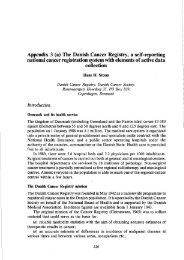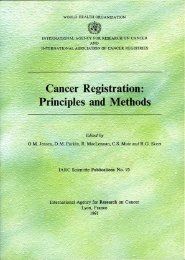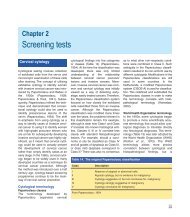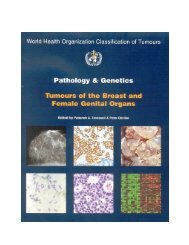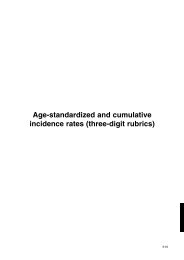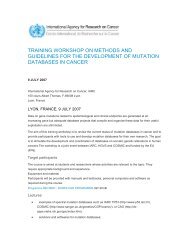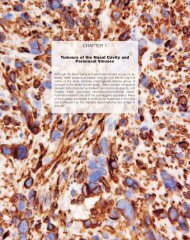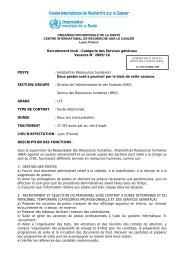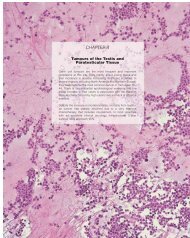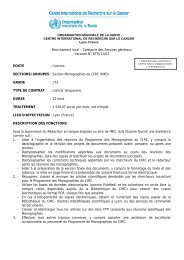Eble JN, Sauter G., Epstein JI, Sesterhenn IA - iarc
Eble JN, Sauter G., Epstein JI, Sesterhenn IA - iarc
Eble JN, Sauter G., Epstein JI, Sesterhenn IA - iarc
You also want an ePaper? Increase the reach of your titles
YUMPU automatically turns print PDFs into web optimized ePapers that Google loves.
nostic role in invasively growing bladder<br />
cancer {1287,2496,2620}. Despite all this<br />
extensive research, there is currently no<br />
molecular parameter that is sufficiently<br />
validated and has sufficient predictive<br />
power to have accepted clinical value in<br />
these tumours.<br />
TP53 Alterations of the TP53 tumour suppressor<br />
gene have been by far the most<br />
intensively studied potential prognostic<br />
marker {2329}. Early studies suggested a<br />
strong prognostic importance of<br />
immunohistochemically detectable<br />
nuclear TP53 protein accumulation in<br />
both pT1 {963,2295} and pT2-4 cancers<br />
{725}, and TP53 analysis was close to<br />
routine application in urinary bladder<br />
cancer {1980}. However, many subsequent<br />
studies could not confirm these<br />
data {777, 1494,2064}. It is possible that<br />
part of these discrepancies are due to<br />
different response rates to specific therapy<br />
regimens for tumours with and without<br />
TP53 alterrations {505,1421,2293}. A<br />
recent metaanalysis of more than 3700<br />
tumours found a weak but significant<br />
association between TP53 positivity and<br />
poor prognosis {2329}. An independent<br />
prognostic role of TP53 alterations was<br />
only found in 2 out of 7 trials investigating<br />
pT2-4 cancer. TP53 alterations may be<br />
clinically more important in pT1 cancer,<br />
since more than 50% of these studies<br />
found independent prognostic significance.<br />
However, it cannot be excluded<br />
that a fraction of overstaged TP53 negative<br />
pTa tumours with good prognosis<br />
has contributed to some of these results<br />
{2306}. Overall, it appears that 1) TP53<br />
alterations do not sufficiently well discriminate<br />
good and poor prognosis<br />
groups in properly staged bladder cancers<br />
to have clinical utility, and 2) currently<br />
used methods for immunohistochemical<br />
TP53 analysis are not reliable<br />
enough for clinically useful measurement<br />
of TP53 alterations.<br />
Cell cycle regulation p21 and p27 inhibit<br />
or stimulate cyclin dependent kinases.<br />
Stein et al. {2495} showed in a series of<br />
242 invasive cancers treated by cystectomy<br />
that TP53+/p21- tumours were<br />
associated with worst prognosis compared<br />
to those with TP53+/p21+ phenotype.<br />
A similar result was obtained by<br />
Qureshi et al. {2126} in a series of 68<br />
muscle invasive non-metastatic tumours<br />
treated with radical radiotherapy. The<br />
expression of p27 protein was a striking<br />
predictor of prognosis in a set of patients<br />
treated by cystectomy and adjuvant<br />
chemotherapy {2620}. A 60% long term<br />
survival was observed in 25 patients with<br />
p27+ tumours as compared to 0% of<br />
patients with p27- tumours. No survival<br />
difference between p27 positive and<br />
negative tumours was observed in the<br />
same study in patients that had not<br />
received adjuvant chemotherapy {2620}.<br />
Inactivation of the retinoblastoma (RB)<br />
gene occurs in 30-80% of bladder cancers<br />
{360,1172,1530,2845}, most frequently<br />
as a consequence of heterozygous<br />
13q deletions in combination with<br />
mutation of the remaining allele {497}.<br />
Several investigators reported an association<br />
between altered Rb expression and<br />
reduced patient survival in muscle invasive<br />
cancers {498,504,1530} and with<br />
tumour progression in pT1 carcinomas<br />
{963}. Others could not confirm these<br />
results {1207,1359,2095}.<br />
HER2 overexpression occurs in 30-70%<br />
of invasive bladder cancers. Some studies<br />
suggested that Her2 expression is a<br />
predictor for patient survival or metastatic<br />
growth {1358,1534,1787,2301} but these<br />
associations were not confirmed by others<br />
{1509,1708,2675}. Gandour-Edwards<br />
et al. recently described an intriguing link<br />
between Her2 expression and improved<br />
survival after paclitaxel-based<br />
chemotherapy {832}. Co-amplification<br />
and co-expression of the adjacent topoisomerase<br />
2 alpha (TOP2A) may also play<br />
a role for an altered chemosensitivity of<br />
HER-2 amplified tumours {1209, 1210}.<br />
EGFR is overexpressed in 30-50% of<br />
invasively growing bladder cancers<br />
{217,457,914,1510,1890,2305,2844}.<br />
Early reports linked EGFR expression to<br />
an increased risk for tumour recurrence<br />
and progression, as well as to reduced<br />
survival {1717,1875,1876}. In one study<br />
with 212 patients, EGFR expression was<br />
even found to be an independent predictor<br />
of progression and survival {1709},<br />
but later studies could not confirm these<br />
results {2152,2475,2611,2748}.<br />
Angiogenesis The extent of angiogenesis<br />
can be quantitated by immunostaining<br />
microvessels using antibodies<br />
against factor VIII or CD34. At least one<br />
study has suggested microvessel density<br />
as an independent prognostic factor in<br />
muscle invasive bladder cancer {260}.<br />
However, this finding was not confirmed<br />
in a subsequent study {1494}. Thrombospondin<br />
(TSP-1) is an inhibitor of<br />
angiogenesis that is enhanced by interaction<br />
with TP53 protein {961}. In one<br />
study, a reduced TSP-1 expression was<br />
significantly associated with disease<br />
recurrence and decreased overall survival<br />
{960}.<br />
Cyclooxygenase (COX) is an enzyme<br />
that converts arachidonic acid into<br />
prostaglandin H2. COX-2 is one enzyme<br />
subtype that is induced by various stimuli<br />
including inflammation and occurs at<br />
elevated levels in many tumour types. A<br />
high COX-2 expression was related to<br />
good prognosis in a series of 172<br />
patients treated by radical cystectomy<br />
{2620}. In another study, however, low<br />
COX-2 expression was significantly<br />
associated with good prognosis in pT1<br />
cancers {1320}.<br />
Infiltrating urothelial carcinoma 109



